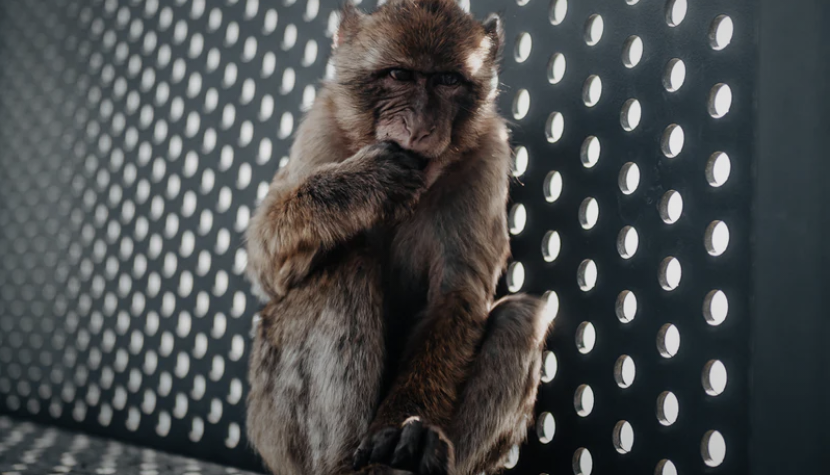
May 05, 2021Animal Law & Policy Clinic, Media ReleaseSecret Policy Uncovered Under the Freedom of Information Act Shows USDA Does Not Inspect Research Labs as Required by the Animal Welfare Act
For Immediate Release, May 5, 2021
A secret policy instituted by the U.S. Department of Agriculture (USDA) and uncovered by Harvard Law School’s Animal Law & Policy Clinic reveals that, in violation of the Animal Welfare Act (AWA), the department does not fully inspect research labs each year to ensure compliance with AWA standards, including standards intended to promote the psychological well-being of primates used in research.
Under the secret policy, if the facility is accredited by the industry-dominated Association for Assessment and Accreditation of Laboratory Animal Care (AAALAC International), the USDA instructs its inspectors not to do a full inspection, but only to review one aspect of the facility—either the animals, the facility itself, or the paperwork that must be kept under the AWA. This means, for example, that for AAALAC International-accredited research labs—a majority of labs doing research on animals in this country—inspectors can simply check whether records are on file, and never look at a single animal to ensure that the animals are being treated humanely.
The discovery of the policy was made by Harvard Law School student Brett Richey as she combed through over a thousand pages of documents the Clinic received after filing a Freedom of Information Act (FOIA) case on behalf of Rise for Animals (formerly the New England Anti-Vivisection Society) and the Animal Legal Defense Fund. The groups have sued the agency for failing to improve the standards for the psychological well-being of primates used in medical research—a requirement that Congress added to the Animal Welfare Act in 1985 because of “the shocking failure of self-policing” by the medical community to ensure that primates are treated humanely, and also required to achieve reliable and valid research results.
In 2018 the USDA solicited public comment on whether it should stop conducting full inspections of labs accredited by AAALAC International. The animal welfare community, including both Rise for Animals and the Animal Legal Defense Fund, strenuously opposed this approach, pointing out that AAALAC International has close ties to the medical research industry and does not even apply AWA standards when deciding accreditation. After receiving over 35,000 comments—most opposed to the policy—the USDA announced to the public that it would not adopt it—a statement we now know is not true.
There are many examples of primate suffering at AAALAC International-accredited facilities, including monkeys becoming tangled in wires and suffocating, dying of dehydration, and suffering second-degree burns from a heating lamp(media document available listing these and other examples in detail).
A 2014 study of USDA inspection reports found that AAALAC International accredited facilities on average have “significantly more” AWA noncompliance items than unaccredited facilities, including “improper veterinary care.” The AWA requires the USDA to inspect all research labs every year to ensure that they are in compliance with all of the “minimum” AWA standards. However, under this secret policy the USDA does not do so, but instead relies on AAALAC International accreditation as evidence of compliance.
The records released under FOIA also reveal that when inspectors inquired if they could conduct a full inspection of AAALAC International-accredited facilities, they were told no because this would not be “fair” to the labs.
Dr. John Gluck, a former lab director and behavioral researcher who worked closely with nonhuman primates for over 25 years, explains: “Good animal care intentions and even written plans do not necessarily translate to humane treatment of the animals themselves. Misinformation and misunderstanding about what is required, especially to promote the psychological well-being of primates can unfortunately abound. The objective USDA inspector is critical to inform and correct inappropriate and inadequate methods of care. Verification by USDA inspectors that all standards are met in real time is absolutely necessary. To somehow decide that AAALAC accreditation is proof of animal welfare and a psychological well-being plan and executional perfection is hard to fathom. Especially since accreditation doesn’t even mean there have been no history of problems at that facility––the designation of Being on Probation.”
Brett Richey added: “This means that for several years now the USDA has been lying to the public about its inspection policy for research labs––it surreptitiously put into place a policy that was overwhelmingly opposed by the public. This is appalling on so many levels–the indifference to tens of thousands of animals subjected to debilitating diseases that deserve our care, deferring to an industry-dominated group, and lying to the public about official government policy when the public overwhelmingly opposed it.”
Compounding the issue, the USDA recently told the federal judge presiding over the Clinic’s pending case that USDA inspectors “examine and document all areas of care and treatment that are covered under the Animal Welfare Act”––a statement that is completely belied by the records obtained under FOIA. After the records were released to the Clinic, the USDA filed a “Notice” with the Court attempting to “clarify” this misrepresentation. The Animal Law & Policy Clinic has filed a response explaining that the newly released documents demonstrate that this statement is not true (this document is also available to the media).
***
Experts available for comment, including former primate scientist Dr. John Gluck, via Sarah Pickering: [email protected], 617 852 6484
